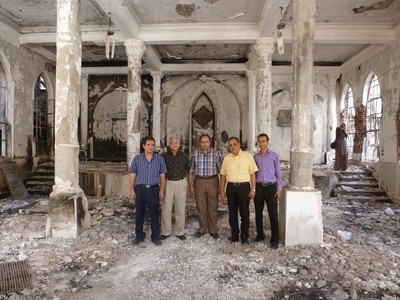Warm greetings to all of you in the grace and peace of Christ. While circumstances continue to be difficult for both Egypt and the larger region, we are very grateful for the opportunity to be here with so many dear friends, colleagues and students.
Many of you have read about the violence in Egypt in August. The significant loss of life and the brutal conflict between the Muslim Brotherhood and their supporters on the one side and the Army on the other has further polarized the country. Sadly, August also marked a dramatic rise in attacks on Christians. Most of the burned churches belonged to the Coptic Orthodox Church and five of them were Egyptian Presbyterian churches. Of these five, four were led by my former students. I focus on these four with the hope that the details of their particulars will put a personal face on the news you are reading.
I remember Sameh, Hani, Manessa and Medhat as bright, kind and somewhat reserved students.
Medhat was in the very first lecture I gave here at the Evangelical Theological Seminary in Cairo (ETSC) back in 1999. He later was asked to interview for a teaching post here at ETSC but lost the job (but won our hearts) when he told his interviewers that his passion and calling was that of a pastor, not a seminary professor.
Hani was a keynote speaker last September at our seminary’s fall retreat. Sameh recently returned to ETSC, where he successfully earned his master’s degree. He currently pastors his church in the city of Minya and teaches part-time in ETSC’s newest branch in that city.
Manessa pastors a large church that has planted other smaller churches in his area. One of these church plants was attacked. They all amazed me with their post-graduation ministries and I am proud to count them as friends and colleagues. During their time at ETSC I never dreamed that they would one day see the church they were serving engulfed in flames.
By all reports, angry, radical Islamists broke into each of these pastors’ churches and set them ablaze. Hani’s home was also ransacked, burglarized and burned. All three pastors and their families were unharmed in the attacks. The pictures that I have seen of the churches are devastating.
Nevertheless, I am amazed at the maturity, wisdom and courage of my former students. Sameh held worship in the charred remains of the sanctuary just four days after the attack. As he addressed the congregation, his words were of hope rather than revenge. He confidently assured his congregation, “This will make us better Christians.”
These stories are important because each person and community is important. I share them with you because I am inspired by these people and grateful that they are a part of my life.
But I would also be doing a disservice if I did not convey some of the other stories I have heard in recent days. In many and even most communities, Muslim neighbors rose up in solidarity and love to protect the churches in their neighborhoods. For every burned church, there are many stories of churches that were protected by communities that refuse to spiral into the violence.
One of Medhat’s classmates in that first lecture I gave is a man named Ekram. He was a bright, energetic, and friendly student. Ekram left ETSC with a vision for his congregation and his community. He has worked hard at building bridges and on August 16 those relationships showed their full strength.
I was moved deeply when I saw Ekram’s Facebook post from that day. It read: “I would like to give a very special thanks to our Muslim and Christian neighbors who defended the church today and protected it from abuse. I give special thanks to Professor Hosny for his balanced [Islamic] sermon that was filled with love. Thank you, Hamadeh Ahmed, Mustafa Sayed, Eid Kamal, Amr Mostafa, Hamada Nagah, and Girgis Joseph.”
Each one of these names moved me—not because I knew any of them, I did not—but because they represent specific, courageous Muslims and Christians who acted in love, compassion and hope of a better society.
I am amazed and humbled that I have the chance to teach people like Ekram, Manessa Medhat, Sameh and Hani. Like the Lord they serve, they are striving to reflect the love, hope and light of God, even in the face of suffering. Thank you for all the ways that you partner with me, pray for me and support me in this work.

